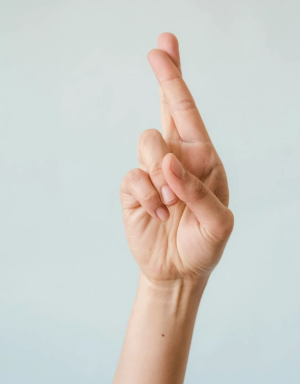19 superstitions that might actually have a scientific explanation
By
Veronica E.
- Replies 0
Most of us have a few superstitions—whether we admit it or not.
Maybe you knock on wood after saying something hopeful, or feel a little uneasy when a black cat crosses your path.
For generations, these beliefs have been passed down through families, often with a smile, a warning, or a wink.
But surprisingly, some of these old sayings may hold a hint of scientific truth.
At The GrayVine, we took a closer look at 19 everyday superstitions that might actually be rooted in psychology, behavioral science, or simple common sense.

Many ancient cultures believed trees held protective spirits.
Today, science suggests this habit works as a form of self-soothing.
It helps ease anxiety and offers a sense of control—especially after tempting fate.
The belief began with the idea that mirrors reflected your soul.
But what really happens is called confirmation bias—you’re more likely to notice bad things after breaking a mirror simply because you're expecting them.
This one might have sacred origins, but it also makes perfect safety sense.
Walking under a ladder can lead to accidents, and avoiding it may be more about protecting yourself than avoiding bad luck.
Black cats were once associated with witches in medieval Europe.
Now, science shows that if you believe it’s bad luck, you’re more likely to feel anxious and make mistakes—a self-fulfilling prophecy in action.
Salt was once incredibly valuable, so spilling it was considered wasteful and unlucky.
If you believe spilling salt brings bad luck, your brain might search for—and find—minor things to go wrong afterward.
Avoiding the 13th floor or skipping events on Friday the 13th? That’s expectancy bias at work.
If you think something will go wrong, you’re more likely to notice small annoyances and blame the date.
This superstition likely started in the Victorian era when umbrellas were spring-loaded and dangerous indoors.
It’s less about luck and more about avoiding broken items and bruised noses.
“Step on a crack, break your mother’s back” is a form of magical thinking.
It gives kids (and adults) the illusion of control over unrelated outcomes—a mental coping mechanism more than a real belief.
Ancient traditions linked candles to divine offerings.
Today, the act of making a wish taps into positive thinking and intention-setting, which can actually improve mood and motivation.
This good luck charm traces back to Celtic folklore.
The placebo effect helps explain why it might “work”—if you believe you’re lucky, you’re more confident and more likely to notice fortunate events.
Many people believe an itchy palm predicts cash on the way.
But it's likely your brain remembering the few times that was true—and forgetting the rest. That’s selective memory at work.
Iron was believed to repel evil spirits, and the shape of the horseshoe became a symbol of protection.
Hanging one above your door can give you a boost of confidence—because you expect good things.
This tradition goes back to ancient Rome and birds being viewed as mystical.
Believing in your wish may inspire you to pursue it more positively—another small example of mindset shaping outcome.
This gesture started as a Christian symbol but now helps reduce stress.
It offers a quick mental distraction and gives people a hopeful feeling during uncertain moments.
Leaving scissors open may have been seen as bad luck, but it’s mostly a safety hazard.
Keeping them closed prevents injuries and damage—a smart household rule disguised as superstition.
This long-standing belief is fun to think about, but the real reason behind itchy ears is usually much more mundane—dry skin, allergies, or a mild irritation.

While some cultures view this as an omen, science points to stress, lack of sleep, or caffeine as the likely culprits.
Still, if you’re worried, you may start noticing more small problems—which fuels the belief.
Romans believed water had sacred properties.
Tossing a coin while making a wish is a ritual that promotes a sense of hope and control—two things that can improve emotional well-being.
The number 666 has long been linked to negative meanings in religious texts.
But when you expect misfortune, your brain starts paying more attention to anything that seems to confirm that fear.
Superstitions may seem outdated, but many of them serve a psychological purpose.
They give us comfort, provide a sense of control, or help us feel hopeful.
In some cases, they keep us safe (like not walking under ladders).
Whether you believe fully or just “play along,” there’s value in these tiny rituals.
Read next:
7 fever myths you still believe—doctors set the record straight!
Experts Have Been Wrong for 60 Years: The Surprising Health Myth You Probably Still Believe!
Cold weather myths exposed—what’s actually making you sick

Do you or your family have a superstition that’s stood the test of time? Have you ever experienced a moment that made you wonder if luck is real? We’d love to hear your story—share it in the comments and keep the conversation going.
Maybe you knock on wood after saying something hopeful, or feel a little uneasy when a black cat crosses your path.
For generations, these beliefs have been passed down through families, often with a smile, a warning, or a wink.
But surprisingly, some of these old sayings may hold a hint of scientific truth.
At The GrayVine, we took a closer look at 19 everyday superstitions that might actually be rooted in psychology, behavioral science, or simple common sense.

Some superstitions may be more than just stories—they could have science on their side. Image source: YouTube / Today I Found Out.
1. Knocking on wood
Many ancient cultures believed trees held protective spirits.
Today, science suggests this habit works as a form of self-soothing.
It helps ease anxiety and offers a sense of control—especially after tempting fate.
2. Breaking a mirror brings seven years of bad luck
The belief began with the idea that mirrors reflected your soul.
But what really happens is called confirmation bias—you’re more likely to notice bad things after breaking a mirror simply because you're expecting them.
3. Walking under a ladder
This one might have sacred origins, but it also makes perfect safety sense.
Walking under a ladder can lead to accidents, and avoiding it may be more about protecting yourself than avoiding bad luck.
4. A black cat crossing your path
Black cats were once associated with witches in medieval Europe.
Now, science shows that if you believe it’s bad luck, you’re more likely to feel anxious and make mistakes—a self-fulfilling prophecy in action.
Also read: Is the Kennedy curse real—or just a myth we can’t let go of?
5. Spilling salt
Salt was once incredibly valuable, so spilling it was considered wasteful and unlucky.
If you believe spilling salt brings bad luck, your brain might search for—and find—minor things to go wrong afterward.
6. Friday the 13th
Avoiding the 13th floor or skipping events on Friday the 13th? That’s expectancy bias at work.
If you think something will go wrong, you’re more likely to notice small annoyances and blame the date.
7. Opening an umbrella indoors
This superstition likely started in the Victorian era when umbrellas were spring-loaded and dangerous indoors.
It’s less about luck and more about avoiding broken items and bruised noses.
8. Stepping on a crack
“Step on a crack, break your mother’s back” is a form of magical thinking.
It gives kids (and adults) the illusion of control over unrelated outcomes—a mental coping mechanism more than a real belief.
Also read: 2025 forecasts: "Prophets" predict alien contact and more—should we listen?
9. Blowing out birthday candles
Ancient traditions linked candles to divine offerings.
Today, the act of making a wish taps into positive thinking and intention-setting, which can actually improve mood and motivation.
10. Carrying a rabbit’s foot
This good luck charm traces back to Celtic folklore.
The placebo effect helps explain why it might “work”—if you believe you’re lucky, you’re more confident and more likely to notice fortunate events.
11. Itchy palms mean money
Many people believe an itchy palm predicts cash on the way.
But it's likely your brain remembering the few times that was true—and forgetting the rest. That’s selective memory at work.
12. Hanging a horseshoe for good luck
Iron was believed to repel evil spirits, and the shape of the horseshoe became a symbol of protection.
Hanging one above your door can give you a boost of confidence—because you expect good things.
Also read: Break These 13 Dining Taboos and the World Will Gasp—How Not to Embarrass Yourself Globally!
13. Wishing on a wishbone
This tradition goes back to ancient Rome and birds being viewed as mystical.
Believing in your wish may inspire you to pursue it more positively—another small example of mindset shaping outcome.
14. Crossing your fingers
This gesture started as a Christian symbol but now helps reduce stress.
It offers a quick mental distraction and gives people a hopeful feeling during uncertain moments.
15. Leaving scissors open
Leaving scissors open may have been seen as bad luck, but it’s mostly a safety hazard.
Keeping them closed prevents injuries and damage—a smart household rule disguised as superstition.
16. Itchy ears mean someone is talking about you
This long-standing belief is fun to think about, but the real reason behind itchy ears is usually much more mundane—dry skin, allergies, or a mild irritation.

A timeless gesture for luck, comfort, and a little extra confidence when you need it most. Image Source: Pexels / Kevin Malik.
Also read: Isaac Newton’s 1704 prediction—when did he say the world would end?
17. A twitching left eye means bad luck
While some cultures view this as an omen, science points to stress, lack of sleep, or caffeine as the likely culprits.
Still, if you’re worried, you may start noticing more small problems—which fuels the belief.
18. Throwing coins in a fountain
Romans believed water had sacred properties.
Tossing a coin while making a wish is a ritual that promotes a sense of hope and control—two things that can improve emotional well-being.
19. Seeing the number 666
The number 666 has long been linked to negative meanings in religious texts.
But when you expect misfortune, your brain starts paying more attention to anything that seems to confirm that fear.
Also read: White eggs or brown? A nutrition expert separates fact from myth
Why we still believe—and why it’s okay
Superstitions may seem outdated, but many of them serve a psychological purpose.
They give us comfort, provide a sense of control, or help us feel hopeful.
In some cases, they keep us safe (like not walking under ladders).
Whether you believe fully or just “play along,” there’s value in these tiny rituals.
Read next:
7 fever myths you still believe—doctors set the record straight!
Experts Have Been Wrong for 60 Years: The Surprising Health Myth You Probably Still Believe!
Cold weather myths exposed—what’s actually making you sick
Key Takeaways
- Many superstitions, like knocking on wood or making birthday wishes, provide psychological comfort and reduce anxiety.
- Some beliefs, such as avoiding ladders or closing scissors, are grounded in basic safety rather than luck.
- Cognitive biases like confirmation bias and expectancy bias help explain why people link bad luck to things like black cats or the number 666.
- Rituals like crossing fingers or carrying lucky charms work through belief and routine, encouraging confidence and positive thinking.
Do you or your family have a superstition that’s stood the test of time? Have you ever experienced a moment that made you wonder if luck is real? We’d love to hear your story—share it in the comments and keep the conversation going.






